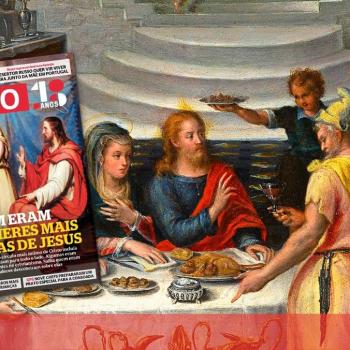In my Sunday school class this weekend we reached chapter 8. It was nice, after so many chapters, to finally reach what the NIV renders as “the point of what we are saying.”
 Those who may have felt like shouting “Get to the point!” in previous classes presumably felt vindicated.
Those who may have felt like shouting “Get to the point!” in previous classes presumably felt vindicated.
But what is the point of the epistle to the Hebrews? It might seem to be simply that “we have this sort of great high priest.” But digging a little deeper into the details reveals that there is more to it.
The idea of Jesus as high priest is of course an attempt to make sense of the death of one believed to be the Messiah. Many early Christians used the language of “seated at the right hand” to refer to his exalted status, and that allusion to Ps. 110 led the author to the Hebrews to an intriguing possibility: that the king depicted in that psalm could also be a priest. This could be connected with the idea of a new covenant, bringing with it a different sort of priesthood. And thus we get the longest single quotation from the Jewish Scriptures at this point in the book, providing the book’s pivot and focal point, Jeremiah’s words about a new covenant.
I can’t help but wonder whether it was material such as that found in Hebrews which, though it probably seemed a liability to some in the period in which it was written, seemed prophetic after the destruction of the temple in the year 70.
The notion of Jesus as the superior high priest of a superior covenant with a superior tabernacle has often led to Christians adding the corollary that it is the possession of a superior people. This misses the point entirely, and is a bad misreading of an inner-Jewish argument by non-Jewish Christians. The idea of a new covenant, and a superior purification, was aimed at seeing the same people be more obedient and less stubborn as they were spiritually transformed. Instead of being read in terms of supersessionism, it needs to be understood as a warning. And that is indeed how the author to the Hebrews takes it. The message is not “You are no longer Jews, no longer part of the old covenant, and therefore you should look down on those who have not shifted their allegiance as you have.” It is rather, as the author to the Hebrews himself puts it, “We must pay the most careful attention, therefore, to what we have heard, so that we do not drift away. For since the message spoken through angels was binding, and every violation and disobedience received its just punishment, how shall we escape if we ignore so great a salvation?” (Hebrews 2:1-3).
What do you understand the point of Hebrews to be?












